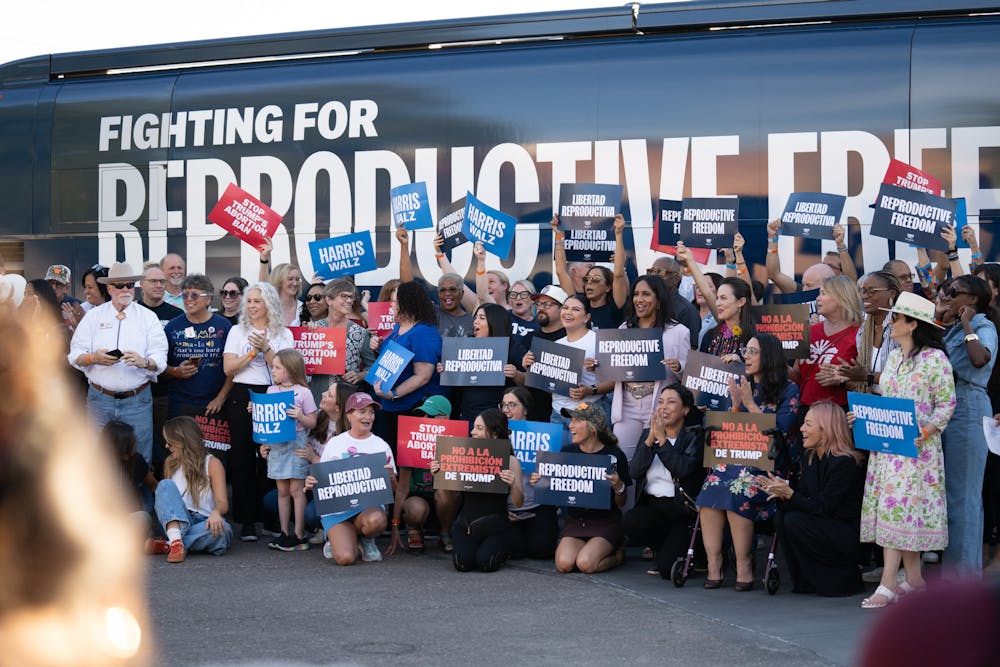On a tour across swing states before the upcoming general election, the "Fighting for Reproductive Freedom" bus stopped in Phoenix with celebrities and politicians campaigning for Vice President Harris and discussing women's reproductive rights.
Hours after First Lady Jill Biden spoke to public school educators and other union workers at the Arizona Education Association headquarters in Phoenix, she headlined the bus tour speaking event. Along with reproductive rights, speeches hit on topics such as gun safety, early voting and the conservative presidential transition movement, Project 2025.
Sen. Mark Kelly, Gov. Katie Hobbs and Senate candidate Ruben Gallego joined Biden as speakers. Celebrities such as Bryan Cranston and Sophia Bush also made appearances.
On stage, Biden took aim at former President Donald Trump and positioned him as the reason for the overturn of Roe v. Wade.
"When I first learned that Roe v. Wade had been overturned, I was shocked, devastated. But, looking back, I really shouldn't have been so surprised," Biden said. "I knew that Donald Trump had hand-picked three justices to restrict reproductive freedom."
In the 2016 presidential debate against Hillary Clinton, Trump said he planned to put "pro-life justices on the court" in hopes of returning decisions about reproductive rights to the states.
READ MORE: Overturn of Roe v. Wade leaves Arizona abortion policy in limbo
"Breaking Bad" actor Bryan Cranston also discussed abortion rights, saying that even as someone who isn't a politician, lawyer or doctor, being a father meant he felt he had to speak on the issue.
"I am a father of a daughter, and it's important to me for her life, bound for the future, and other father's daughters to be able to have within their lifetime the fundamental right of freedom of choice," Cranston said. "There should not be anyone but them deciding what happens to their own body."
Texas resident Kate Cox gave a speech on the hardship she experienced while trying to seek an abortion in her home state. In 2023, Cox sued the Texas government for denying her access to an abortion due to medical complications.
"I wanted to access that care in my home state, close to my family, my loved ones and my doctors," Cox said. "I never imagined having to fight for something so basic as a procedure to save my health."
Cox's words made a strong, lasting impression on many of those listening to her personal anecdote.
"She's seen the impact that it's had and she's sharing her story, which honestly is really brave, and it's also really impactful for people to hear just personal testimonials about how these laws impact everyday Americans," said Dhruv Rebba, a junior studying computer science.
This election cycle, abortion has been a hot-button topic on the ballot, especially as Arizona recently repealed the 1864 near-total abortion ban. Voters will have to decide on Proposition 139, which would enshrine the right to an abortion in the state constitution.
READ MORE: Gov. Katie Hobbs signs repeal of 1864 abortion ban: What this means for students, community
"With Roe v. Wade being overturned, I was absolutely appalled" said Dallas Salas, a graduate student studying healthcare innovation. "I was appalled because it has super huge ramifications for our future, our liberties and our way of life."
Speakers also stressed the importance of voting in this election, especially in a swing state such as Arizona.
"Listen to your instinct, listen to your gut, and you'll know what to do," Cranston said. "We trust that you will know what to do. Do the right thing. If you vote, you have the voice, and I want to hear from you."
Edited by George Headley, Sophia Ramirez and Alexis Heichman.
Reach the reporter at mamareng@asu.edu and follow @matthewmarengo on X.
Like The State Press on Facebook and follow @statepress on X.
Matthew is a sophomore studying journalism and mass communications. This is his third semester with The State Press. He has also worked at The Cut Network.




